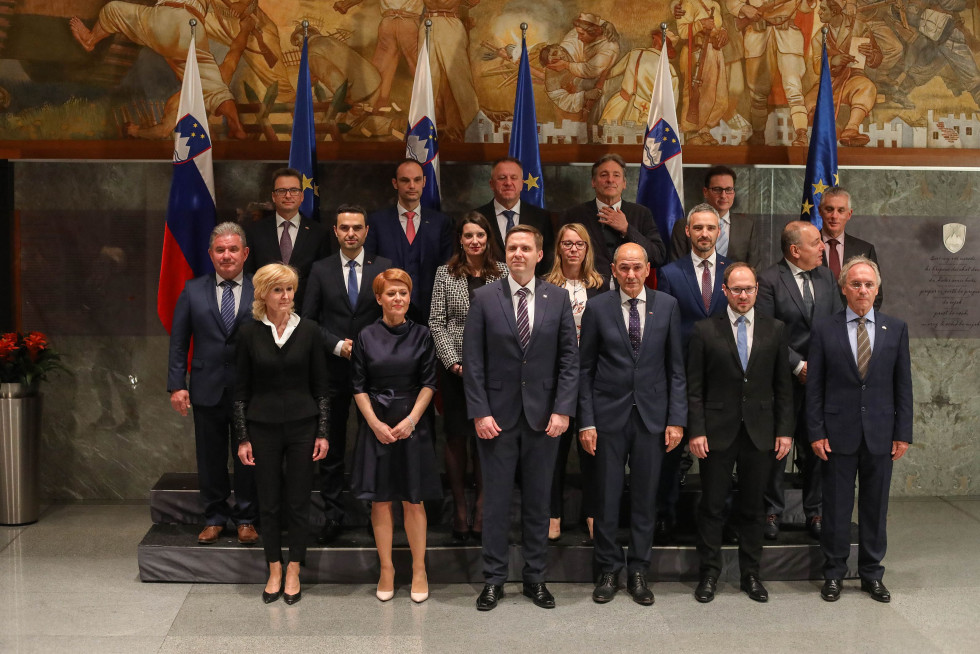20 June – 100 days of the Government led by Janez Janša
The rapid containment of the epidemic was also a result of the decisive action of the current Government, which took some decisive and effective measures during its first days in power: on 13 March 2020, when the current Government was confirmed, 48 new coronavirus infections were recorded in Slovenia, 100 days later – despite the recent increase in infections – the situation in Slovenia is calming down, mainly thanks to several months of hard work by medical staff, police officers, the Civil Protection Service and everyone who has consistently observed the protective measures. No one wants that situation to repeat itself, so the recent call by Prime Minister Janez Janša to strictly follow the measures taken is very much appropriate.
The first, second and third anti-corona package
With a clear public consensus that strict measures to halt public life are necessary to curb the epidemic, the question regarding the consequences for the country, its citizens and the economy had become increasingly valid. Accordingly, the Government worked on two levels: if one of the first measures to curb the spread of the epidemic was to temporarily ban the supply and sale of goods and services directly to consumers, the Government also prepared the first intervention measures to mitigate the consequences of that measure. The public health aspect and taking measures in this area were guided by an expert group at the Ministry of Health led by Dr Bojana Beovič, while the guidelines for helping the economy were developed by a group of economists led by economist Dr Matej Lahovnik.
The packages of intervention measures followed each other in weekly intervals, with the common goal being to alleviate the social hardships of people and help the economy to survive the shock of lockdown. With the first two packages, the Government preserved 260,000 jobs and channelled direct financial assistance to as many as 1.3 million people during the epidemic. The social hardships of people have been mitigated by the provisional introduction of a basic monthly income, a one-off solidarity bonus, the automatic extension of all the rights to public funds, and exemption from payment for public services that have not been available, for example kindergartens and school meals, while businesses have been entitled to a labour costs subsidy, the deferred payment of loans and a guarantee scheme; the third package focused on tourism and the sectors most affected in the long run, as well as on the launch of a new investment cycle.
The Government's key task: to stimulate investment
While the epidemic is under control and people's lives are slowly getting back on track, the Slovenian Government is looking to the future. The actual effect of the measures already taken is yet to be seen, but the current economic forecasts of domestic and international institutions are relatively positive, as they indicate that following a severe shock and declining growth the Slovenian economy will recover and again achieve significant growth as early as next year. This is also confirmed by the fact that a few days ago the S&P credit rating agency affirmed Slovenia's AA- rating with a stable outlook.
The Government believes that investment to kick-start the economy after the epidemic is crucial, which is why it has already approved 187 important projects that will be coordinated at the government level, backed by accelerated and streamlined procedures necessary for their execution. The role of the recently established Debureaucratisation Council will also come to the fore.
As with the introduction of tourism vouchers, the Government paid attention to the multiplier effect of investments when determining their list. The launch of investments seeks to increase economic growth in all sectors of the state, including the construction industry and other industries such as sales, the furnishing of premises, brokerage, trade, etc.
Pursuing priorities until the end of the term of office
The government’s first priority is, undoubtedly, the drafting of the revised budget that the Government plans to submit to the National Assembly by 1 September. The baselines for drafting the revised budget will take into account expenditure related to the anti-corona measures, the new economic forecast by the Institute of Macroeconomic Analysis and Development (IMAD), and the ongoing implementation of the state budget. On this basis, expenditure policy and priorities can be conceived and a breakdown of funds by individual line ministries will also be provided. The recent amendment to the Ordinance on the framework for the preparation of the general government budgets has raised the ceiling for general government expenditure in 2020 from EUR 10.450 billion to EUR 12.525 billion.
Demographic challenges and regulation of long-term care and the reform of social systems will be at the forefront in the coming months. It will also be necessary to address the shortcomings that have been dragging on for many years in the field of health infrastructure. Updates will also be necessary in terms of preparations for a possible recurrence of coronavirus spread. The risk of a new wave of migrants will also require effective and enhanced protection of the state border, and infrastructure projects such as the Third Development Axis will also need to be launched and completed. The government will improve the absorption of European funds, we will certainly draw from funds intended for reconstruction after the coronavirus epidemic. Intensive negotiations for the multiannual financial framework are also under way at the moment. Negotiations are demanding, but we expect excellent results.


